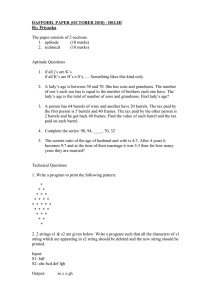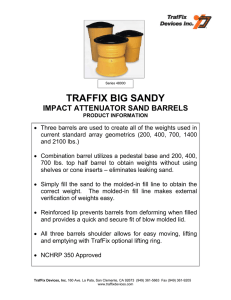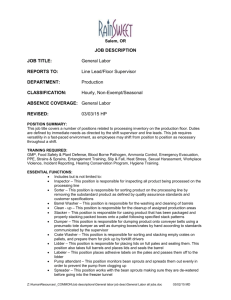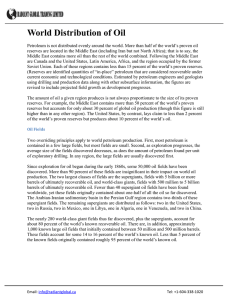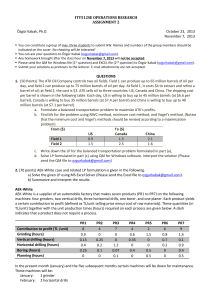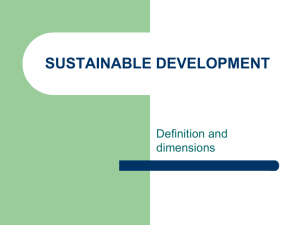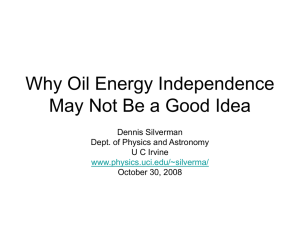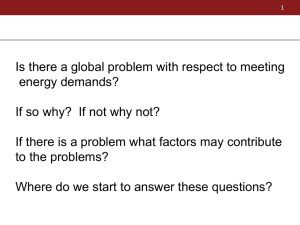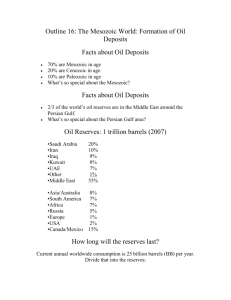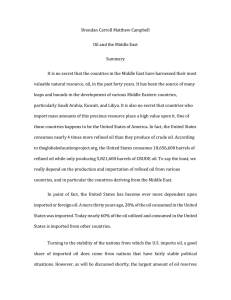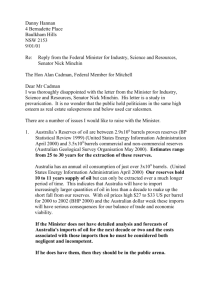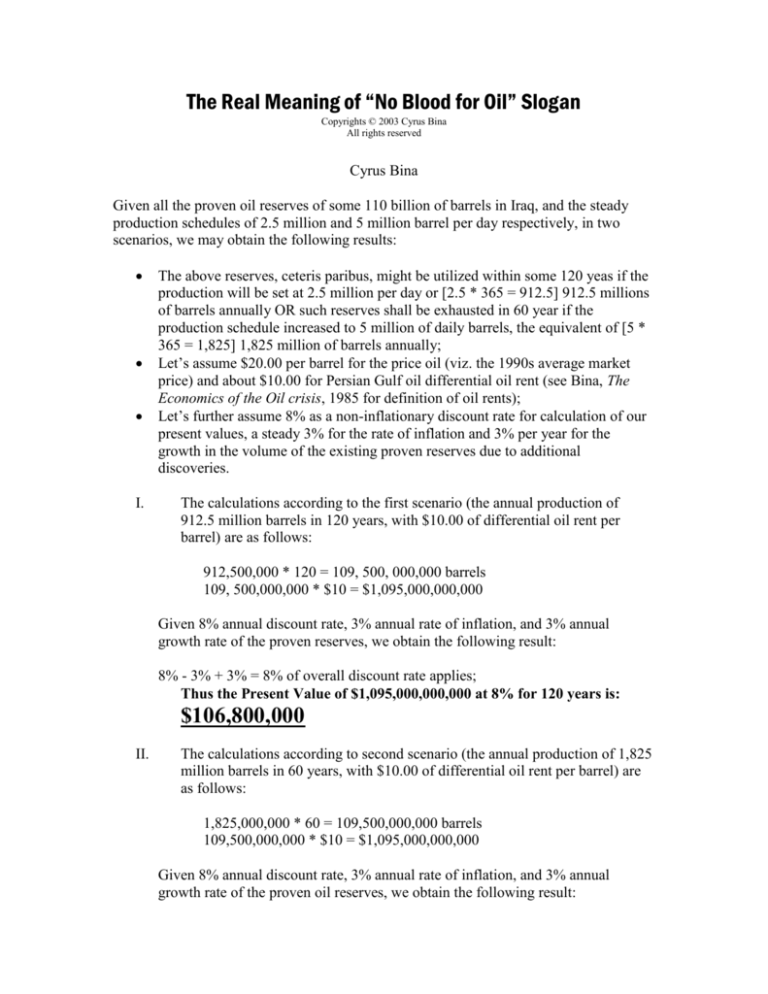
The Real Meaning of “No Blood for Oil” Slogan
Copyrights © 2003 Cyrus Bina
All rights reserved
Cyrus Bina
Given all the proven oil reserves of some 110 billion of barrels in Iraq, and the steady
production schedules of 2.5 million and 5 million barrel per day respectively, in two
scenarios, we may obtain the following results:
I.
The above reserves, ceteris paribus, might be utilized within some 120 yeas if the
production will be set at 2.5 million per day or [2.5 * 365 = 912.5] 912.5 millions
of barrels annually OR such reserves shall be exhausted in 60 year if the
production schedule increased to 5 million of daily barrels, the equivalent of [5 *
365 = 1,825] 1,825 million of barrels annually;
Let’s assume $20.00 per barrel for the price oil (viz. the 1990s average market
price) and about $10.00 for Persian Gulf oil differential oil rent (see Bina, The
Economics of the Oil crisis, 1985 for definition of oil rents);
Let’s further assume 8% as a non-inflationary discount rate for calculation of our
present values, a steady 3% for the rate of inflation and 3% per year for the
growth in the volume of the existing proven reserves due to additional
discoveries.
The calculations according to the first scenario (the annual production of
912.5 million barrels in 120 years, with $10.00 of differential oil rent per
barrel) are as follows:
912,500,000 * 120 = 109, 500, 000,000 barrels
109, 500,000,000 * $10 = $1,095,000,000,000
Given 8% annual discount rate, 3% annual rate of inflation, and 3% annual
growth rate of the proven reserves, we obtain the following result:
8% - 3% + 3% = 8% of overall discount rate applies;
Thus the Present Value of $1,095,000,000,000 at 8% for 120 years is:
$106,800,000
II.
The calculations according to second scenario (the annual production of 1,825
million barrels in 60 years, with $10.00 of differential oil rent per barrel) are
as follows:
1,825,000,000 * 60 = 109,500,000,000 barrels
109,500,000,000 * $10 = $1,095,000,000,000
Given 8% annual discount rate, 3% annual rate of inflation, and 3% annual
growth rate of the proven oil reserves, we obtain the following result:
8% - 3% + 3% = 8% of overall discount rate applies;
Thus, the Present Value of $1,095,000,000,000 at 8% for 60 years is:
$10,810,000,000
Hence, given these two scenarios, the price tag for this PRIZE cannot more than $11
billion. Now, let’s assume that the Iraqi oil reserves are underestimated and, say, five
times more than the reported figures by OPEC. Then, ceteris paribus, on can multiply the
highest figure of $11 billion by 5, thus obtaining a present value of $55 billion. Let’s
further assume that our reasonable figure of $10 for differential rent per barrel (obtained
from the average oil price of $20 in the 1990s) will be doubled!! Again, we cannot find a
figure significantly more than $110 billion as the Iraqi oil price tag $110 billion. Isn’t
this a chum change, not to mention the incalculable human cost of war, relatively to the
anticipated and unanticipated cost of what the Bush administration has already proposing
for the prosecution of war with Iraq and its subsequent period of occupation?
In my judgment, the left has to think seriously about the slogan of “No Blood for Oil.”
Optimistically, this slogan refers to the tip of the iceberg; realistically, it is misleading on
the cause of the war, this one and the previous one. The cause of war is due to lose of the
U.S. hegemony and its historical impossibility of gaining it back (see my “Rhetoric of Oil
and the Dilemma of War and American Hegemony,” Arab Studies Quarterly, Summer
1993, 15 (3), pp. 1-20; “Oil, Japan, and Globalization,” Challenge, May/June 1994, 37
(3), pp. 41-48; “On the Sand Castles and Sand-Castle Conjectures: A Rejoinder,” Arab
Studies Quarterly, Winter/Spring 1995, 17 (1&2), pp. 167-171; Globalization: The
Epochal Imperatives and Developmental Tendencies,” in Political Economy of
Globalization, Gluwer Academic Press, 1997, pp. 41-58). You may call this Bina’s
impossibility theorem!!
Tuesday, March 25, 2003
Minnesota, USA
Cyrus Bina, Ph.D.
Professor of Economics and Management
University of Minnesota, Morris
Morris, MN 56267
Phone: (320) 589-6193
Fax: (320) 589-6117
E-mail: binac@mrs.umn.edu
2

